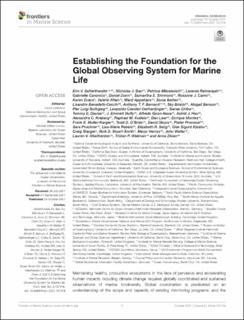Establishing the Foundation for the Global Observing System for Marine Life
| dc.contributor.author | Satterthwaite, Erin V. | |
| dc.contributor.author | Bax, Nicholas J. | |
| dc.contributor.author | Miloslavich, Patricia | |
| dc.contributor.author | Ratnarajah, Lavenia | |
| dc.contributor.author | Canonico, Gabrielle | |
| dc.contributor.author | Dunn, Daniel | |
| dc.contributor.author | Simmons, Samantha E. | |
| dc.contributor.author | Carini, Roxanne J. | |
| dc.contributor.author | Evans, Karen | |
| dc.contributor.author | Allain, Valerie | |
| dc.contributor.author | Appeltans, Ward | |
| dc.contributor.author | Batten, Sonia | |
| dc.contributor.author | Benedetti-Cecchi, Lisandro | |
| dc.contributor.author | Bernard, Anthony T. F. | |
| dc.contributor.author | Bristol, Sky | |
| dc.contributor.author | Benson, Abigail | |
| dc.contributor.author | Buttigieg, Pier Luigi | |
| dc.contributor.author | Gerhardinger, Leopoldo Cavaleri | |
| dc.contributor.author | Chiba, Sanae | |
| dc.contributor.author | Davies, Tammy E. | |
| dc.contributor.author | Duffy, J. Emmett | |
| dc.contributor.author | Giron-Nava, Alfredo | |
| dc.contributor.author | Hsu, Astrid J. | |
| dc.contributor.author | Kraberg, Alexandra C. | |
| dc.contributor.author | Kudela, Raphael M. | |
| dc.contributor.author | Lear, Dan | |
| dc.contributor.author | Montes, Enrique | |
| dc.contributor.author | Muller-Karger, Frank E. | |
| dc.contributor.author | O’Brien, Todd D. | |
| dc.contributor.author | Obura, David | |
| dc.contributor.author | Provoost, Pieter | |
| dc.contributor.author | Pruckner, Sara | |
| dc.contributor.author | Rebelo, Lisa-Maria | |
| dc.contributor.author | Selig, Elizabeth R. | |
| dc.contributor.author | Kjesbu, Olav Sigurd | |
| dc.contributor.author | Starger, Craig | |
| dc.contributor.author | Stuart-Smith, Rick D. | |
| dc.contributor.author | Vierros, Marjo | |
| dc.contributor.author | Waller, John | |
| dc.contributor.author | Weatherdon, Lauren V. | |
| dc.contributor.author | Wellman, Tristan P. | |
| dc.contributor.author | Zivian, Anna | |
| dc.date.accessioned | 2022-01-18T09:01:48Z | |
| dc.date.available | 2022-01-18T09:01:48Z | |
| dc.date.created | 2021-12-03T11:22:45Z | |
| dc.date.issued | 2021 | |
| dc.identifier.citation | Frontiers in Marine Science. 2021, 8 . | en_US |
| dc.identifier.issn | 2296-7745 | |
| dc.identifier.uri | https://hdl.handle.net/11250/2837813 | |
| dc.description.abstract | Maintaining healthy, productive ecosystems in the face of pervasive and accelerating human impacts including climate change requires globally coordinated and sustained observations of marine biodiversity. Global coordination is predicated on an understanding of the scope and capacity of existing monitoring programs, and the extent to which they use standardized, interoperable practices for data management. Global coordination also requires identification of gaps in spatial and ecosystem coverage, and how these gaps correspond to management priorities and information needs. We undertook such an assessment by conducting an audit and gap analysis from global databases and structured surveys of experts. Of 371 survey respondents, 203 active, long-term (>5 years) observing programs systematically sampled marine life. These programs spanned about 7% of the ocean surface area, mostly concentrated in coastal regions of the United States, Canada, Europe, and Australia. Seagrasses, mangroves, hard corals, and macroalgae were sampled in 6% of the entire global coastal zone. Two-thirds of all observing programs offered accessible data, but methods and conditions for access were highly variable. Our assessment indicates that the global observing system is largely uncoordinated which results in a failure to deliver critical information required for informed decision-making such as, status and trends, for the conservation and sustainability of marine ecosystems and provision of ecosystem services. Based on our study, we suggest four key steps that can increase the sustainability, connectivity and spatial coverage of biological Essential Ocean Variables in the global ocean: (1) sustaining existing observing programs and encouraging coordination among these; (2) continuing to strive for data strategies that follow FAIR principles (findable, accessible, interoperable, and reusable); (3) utilizing existing ocean observing platforms and enhancing support to expand observing along coasts of developing countries, in deep ocean basins, and near the poles; and (4) targeting capacity building efforts. Following these suggestions could help create a coordinated marine biodiversity observing system enabling ecological forecasting and better planning for a sustainable use of ocean resources. | en_US |
| dc.language.iso | eng | en_US |
| dc.title | Establishing the Foundation for the Global Observing System for Marine Life | en_US |
| dc.type | Peer reviewed | en_US |
| dc.type | Journal article | en_US |
| dc.description.version | publishedVersion | en_US |
| dc.source.pagenumber | 0 | en_US |
| dc.source.volume | 8 | en_US |
| dc.source.journal | Frontiers in Marine Science | en_US |
| dc.identifier.doi | 10.3389/fmars.2021.737416 | |
| dc.identifier.cristin | 1964133 | |
| cristin.ispublished | true | |
| cristin.fulltext | original | |
| cristin.qualitycode | 1 |
Tilhørende fil(er)
Denne innførselen finnes i følgende samling(er)
-
Articles [3001]
-
Publikasjoner fra CRIStin [3025]
